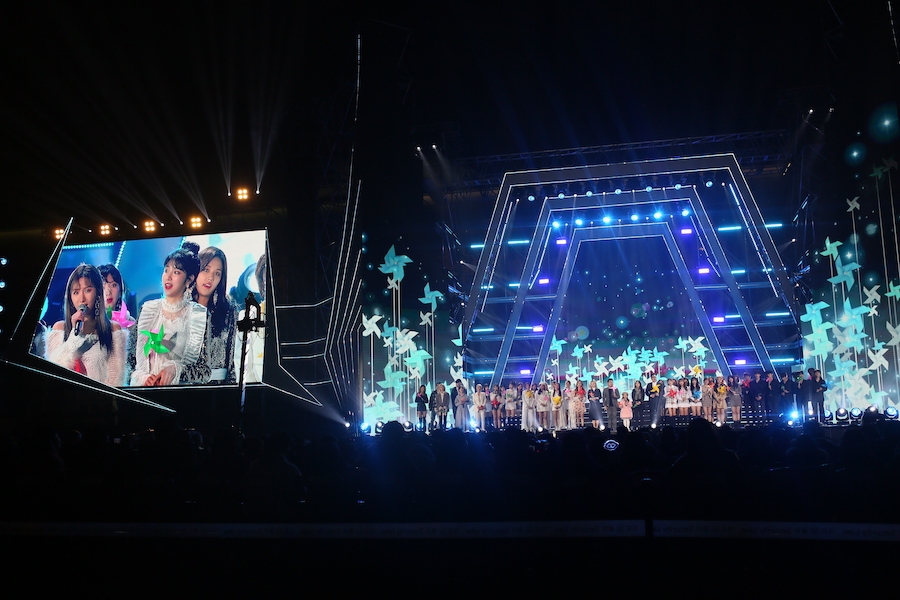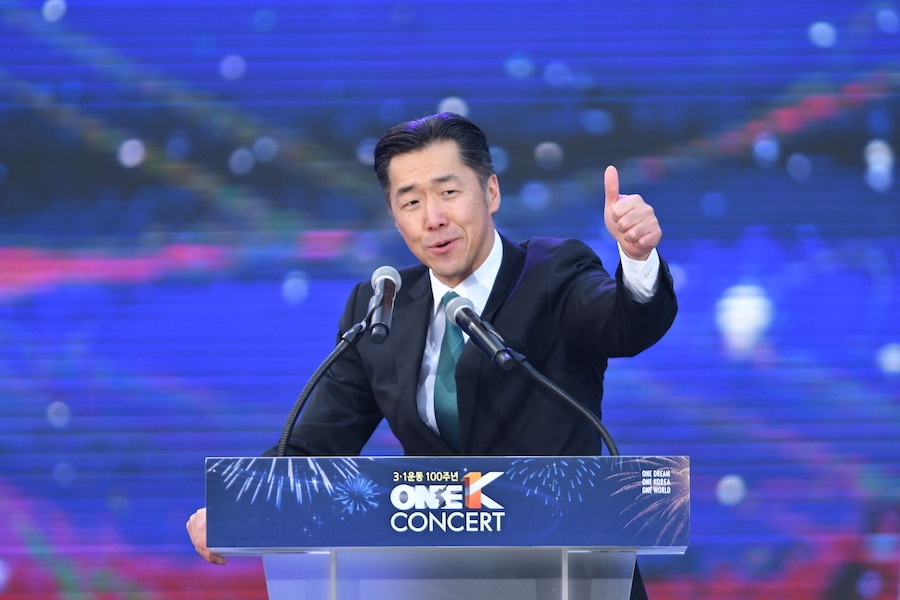With the power to move people from all backgrounds, music is being used to spread the message of peaceful reunification of the Korean peninsula through the popular K-Pop music genre sweeping the international stage. Artists nicknamed “One K Stars” include K-pop groups like ASTRO and Dreamcatcher who performed at the One K Concert in Seoul on the 100th anniversary of the March 1 Independence Movement.
“The reason why music is so important is that it’s the best way to encapsulate a message and bring it to the masses,” Dr. Hyun Jin P. Moon said in a speech at an opening ceremony for the concert.
Read the full article on The Korea Times.
By Kang Hyun-kyung
Music is powerful enough to move people to act in a certain direction with an intended message that has been put into the song.
This rationale was behind the One K Concert, a K-pop concert that aimed to achieve peace on the Korean Peninsula and pave the way for global peace, held on the National Assembly lawn in Seoul, Friday.
During the four-hour event to commemorate the centennial of the March 1 Independence Movement, 22 K-pop artists ― including Korean-American singer Kim Jo-han, singer-songwriter Ali, boy band SF9 and the six-member band Astro ― performed in front of an audience of 8,000 people from around the world.
Moon Hyun-jin, better known as Hyun Jin Preston Moon abroad, founder and chairman of the
Global Peace Foundation, touted music as an inspiring, fascinating instrument that can help the two Koreas, which are technically at war, end decades of animosity and move toward peace and reconciliation.
“The reason why music is so important is that it’s the best way to encapsulate a message and bring it to the masses,” he said in a speech at an opening ceremony for the concert.
For the United States, Moon, a U.S.-educated advocate for Korea’s unification, claimed music played a key role in putting an end to war.
“The Vietnam War came to an end because young people, especially musicians, inspired the anti-war message, putting it into a song, and that eventually brought about a cultural, historic revolution. That brought the Vietnam War to an end,” he said.
The K-pop concert was held at the National Assembly one hundred years after some two million Koreans took to the streets and launched peaceful, non-violent demonstrations across the country to promote Korea’s independence from Japanese colonial rule (1910-1945).
According to Moon, Koreans were wise enough to know peaceful, non-violent protests would have a lasting, worldwide impact on everyone.
Moon said the peaceful uprising inspired India’s non-violent independence movement against the British colonial empire, the American civil rights movement and even South Africa’s non-violent movement that ended the Apartheid regime.
Over the past century, there has been tremendous changes in the status of South Korea. She is a free, independent state that determines her own destiny. South Korea rose from the ashes of the Korean War (1950-53) and achieved miraculous economic growth to become one of Asia’s most resilient economies. This has inspired many developing countries to emulate it.
Despite South Korea’s stunning transformation over the past century, religious leaders and politicians who attended the One K Concert presented the view that the March 1 Independence Movement still resonates.
Robert A. Schuller, an author and evangelist, and a member of the Global Leadership Council of the United States of America, said the peaceful demonstrations on March 1, 1919 became a historic event as it reaffirmed that Koreans were determined to act for their own destiny and future.
“We also recognize that resolving the long-standing problems on the Korean Peninsula requires international cooperation and support,” he said in a speech at the opening ceremony.
Rep. Lee Jong-kul, chairman of the 2019 Global Peace Convention, mentioned the rare parallels between the concert venue and the March 1 Independence Movement.
“We gather here at the National Assembly which was built 100 years ago, the same year the nationwide peaceful protests occurred,” he said.
Rep. Lee himself is a descendant of freedom fighters. His grandfather is Lee Hoi-young (1867-1932) who was an independence fighter, educator and progressive thinker for his time. Rep. Lee’s great uncle is Lee Si-hyung (1868-1953) who also fought for independence and later served as Korea’s first vice president after the country was liberated from colonial rule in 1945.
Rep. Lee reminded the audience of what Kim Gu, a towering figure in the independence movement, had envisioned for Korea 100 years ago. “He hoped Korea could become a cultural power. We are here at the National Assembly when Korea is emerging as a global cultural power. What a coincidence in Korea between 100 years ago and now!” he said.
Seoul Mayor Park Won-soon said the key three messages from the March 1 Independence Movement that still hold true for South Korea now are peace, freedom and justice.
“Culture is a prime platform that can realize these three core messages from the peaceful movement one hundred years ago,” he said. “History is a conversation between the past and the present and it is also a message for the future… I hope the One K Concert today can help the nation realize the dream that our independence fighters dreamt of 100 years ago. Their vision was clear. They dreamed of Korea’s rise as a global cultural power. I hope we can make that dream come true through the K-pop concert.”
Keiko Kobayashi, chairwoman of World Peace Foundation, said the legacy of Korea’s 33 pioneers, who participated in producing the Declaration of Independence and read it loudly to declare Korea as an independent country at a restaurant in Seoul on March 1, 1919, inspired her and it also seemed to have brought people together at the National Assembly for the concert.
“The declaration moved me,” she said. “I hope today can be a historic moment for global peace.”
A joint choir consisting of Korean and Japanese citizens opened the K-pop concert singing “When the Day Comes.” All guests and 22 K-pop artists gathered on the stage at the end of the concert for a ceremony involving the release of doves to send a message of peace.


